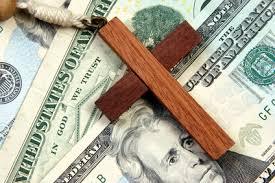The Church and Capitalism in the market

Weber’s book The Protestant Ethic and the Spirit of Capitalism, was intriguing as another foundational and classical resource of understanding how modern western society might have gotten to where it’s at today. History seems replete with evidence of the West’s influence on religion and market economics. Polanyi corroborates the fact that the modern “market society was born in England”[1] thus European industrial capitalism, and at the same time, Debbington also reveals that “evangelical religion is a popular Protestant movement that has existed in Britain since the 1730s.”[2] The preceding remarks clearly show the relationship between the Protestant religious background and the market economics. One then begins to appreciate the complex dynamics between the current reality of how commerce and consumerism have impacted the modern and post-modern church. If Calvinism, Pietism, Methodism, and Baptist-based Christianity to a certain extent, are directly responsible for the historical birth of modern capitalism as Weber put it, are they still responsible for the nurturing of the contemporary market society? Is there a trickle- down market based church effect? If so, then what implications does such a historicity bring to bear for consumerism in the church today? Consumerism is not what I wanted to address, rather I am curious about the history in this week’s reading.
I was not able to arrive at a conclusive answer about the previous questions because as I read further about the spirit of capitalism, Weber reveals ”an historical individual: a complex of elements associated in historical reality which we united into a conceptual whole from the standpoint of their cultural significance.” [3] At the same time the author labors to show that Protestant doctrine engineered the pathway for the acceptance of work and monetary acquisition “contrary to the ethical feelings of whole epoch…”[4] as a divine ordinance. For example, Weber writes, Calvinism, in comparison to other puritan sects, appeared to be more closely related to the active enterprise of bourgeois-capitalistic entrepreneurs.[5]
With the data presented in Weber’s book that implicates Christianity, I am led to ponder on the past as it pertains to the present; where are the markets leading society? Why does the Church in general seem to pledge allegiance first to the market and then to the state? Is possible to rethink and recant from the market dysfunctions? Let me also indicate that there are advantages to markets. In fact, Sandel notes, “A market economy is a tool a valuable and effective tool for organizing productive activity. A market society is a way of life in which market values seep into every aspect of human endeavor. It’s a place where social relations are made over in the image of the market.”[6]
However, there are greater moral questions which arise for the church especially if the church’s theology is inseparably intertwined with the market system. Believers ought to think through daunting challenges of markets and the church’s rightful response to the prevailing obstacles. Sandel warns by naming such impediments:
One is the persisting power and prestige of market thinking, even in the aftermath of the worst market failure in eight years. The other is the rancor and emptiness of our public discourse. These two conditions are not entirely unrelated.
[1] Karl Polanyi, The Great Transformation: The Political and Economic Origins of Our Time (Boston, MA: Beacon Press, 2001), 1423.
[2] D.W. Bebbington, Evangelicalism in Modern Britain: A History from the 1730s to the 1980s (New York: Rutledge, 1989), 1.
[3] Max Weber, The Protestant Ethic and the Spirit of Capitalism (New York, NY: Dover, 2003), 47.
[4] Ibid., 73.
[5] Ibid., 88.
[6] Michael. J. Sandel, What Money Can’t Buy: The Moral Limits of Markets. (Kindle Locations 157). Wiley. Kindle Edition.
Leave a Reply
You must be logged in to post a comment.